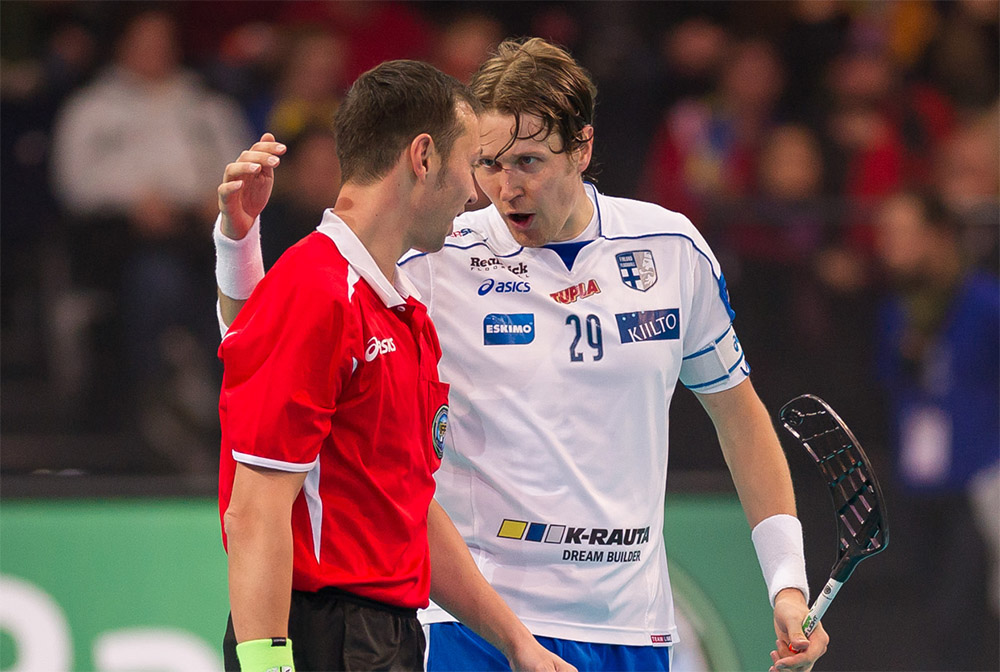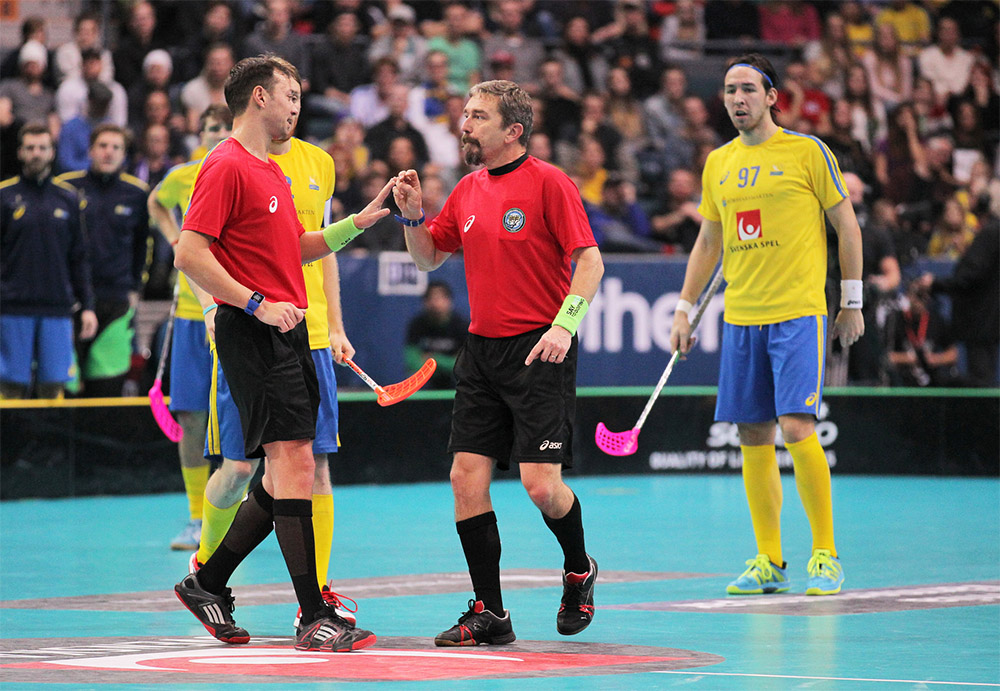Some floorball legends have never scored an overtime goal, have never made an impressive tackle or stopped a shot. Petr Cerny and his long term referee fellow Jiri Janousek for example.
The Czechs have elected their best referees for fifteen times. Petr Cerny and Jiri Janousek topped this ranking thirteen times.
The popular couple has made it to the international top as well. Cerny and Janousek have whistled all major IFF finals, the most prestigious one, the WFC Men’s final, even twice (2012 and 2014). A third will not follow.
After almost 22 years Cerny and Janousek decided to call it a career. And it was an incredible one. We talked to Petr Cerny about how to become a referee legend.
___STEADY_PAYWALL___
Floorballmag: Once you were captain of the Czech national. What went wrong that you became a ref?
Come on, that was 1994. That’s prehistoric (laughing). My playing abilities were kind of vague. And in that time, it was more important to find someone to whistle.
And then you met Jiri.
Back then we were both defenders of IBK Spoje Praha, the predecessor of today’s AC Sparta Praha. And on December 10, 1994, we decided to whistle our first match. And since then we’re a „couple“.
That’s almost 22 years. How did the game change during that time?
The tactics changed, technical skills, the speed. But I guess the biggest difference is the physical game. Back then body contact was almost forbidden, today a floorball is like a battle field.
So what are the most important skills of a referee? Apart from knowing the rules and reading the game.
You have to have a healthy self-confidence and you have to be brave top show it. On the other hand be humble, don’t block off, try to communicate. You need a sense for justice, too. Then you should respect every actor around the field and you should be fit.
When young refs start their career, what are the most common mistakes?
They should be patient and humble. I call it „King’s Effect“. At the moment a referee starts to think, he whistled enough to be always right, he’s lost. He will lose the respect and that’s a thing you earn back very heavily.
You also mentioned communication as a key feature. Is it more reasonable to build a friendly relationship to the players or the show who’s the boss?
The differs from referee couple to referee couple. The player and teams are different, too. Some need a friendly some a more direct approach. Under any conditions, respect is the fundament to a successful match. Everyone has his role. Players play, referees lead, not decide.
I’ve never seen a referee changing his decision after some player complaint about some specific call. When does it make sense to approach a referee, to tell him you don’t agree? Does such a situation exist at all?
It’s a matter of balance. The balance of respect, communication and emotions. Nobody wants long debates on the field. Unfortunately players get very emotional pretty quickly so rational discussions are almost impossible. But actually it’s pretty easy. A referee should decide by what he sees, not what he thinks. First when he’s not sure he can rely on his feelings and his experiences. However, in such cases it’s always good to have your colleague on the field to give you a push into some direction.

Is there something like talent in refereeing?
It’s being called feeling for the game. That you cannot learn. Either you have it or you don’t. Every game has it’s own logic and to be able to read it you need to a certain feel. It allows you to control the atmosphere. It’s an ability which is difficult to explain or teach and if you don’t have it any match can unravel quickly – even if you haven’t made any mistake.
A good referee is an invisible referee. Bat that means that if any reactions occur, they are mostly negative. How do you deal with hard feelings?
A referee should mistake a „liberal“ approach with the reluctance or the inability to make unpopular calls. That’s the reason why player get into such a bad mood. I recommend, to analyze the whole match, every mistake and every difficult call. And it’s very important to do this with your colleague. These are the tools to move forward and to get better.
Do you remember your most peculiar match?
There were some, but no specific one. Well, actually… the final of the Olympic Games. And then I woke up (laughing). That will stay a dream I’m afraid.
You announced that there won’t be any further World Championship final. But that’s not the end to your whole career, is it?
Before the WFC 2015 in Göteborg we announced that because of familiar reasons that will be our last larger IFF event. However, now we decided to end our international IFF career by the end of 2016. But we’ll continue in the Czech Superliga for as long as our families and our bodies allow.
WFC Men’s final referees
1996: Govind Esterman, Matthias Schacke (CH)
1998: Marko Matinvesi, Oskari Saari (FIN)
2000: Pål Espen Groth, Per Westreng (NOR)
2002: Jürg Baumgartner, Marcel Baumgartner (CH)
2004: Mikko Alakare, Jukka-Pekka Koskela (FIN)
2006: Thomas Baumgartner, Thomas Kläsi (CH)
2008: Rune Ali Zouhar, Kim Alexander Hofgaard Jorstad (NOR)
2010: Thomas Erhard, Philippe Renz (CH)
2012: Petr Černý, Jiří Janoušek (CZ)
2014: Petr Černý, Jiří Janoušek (CZ)
2016: Martins Larinovs, Martins Gross (LAT)
2018: Martins Larinovs, Martins Gross (LAT)

